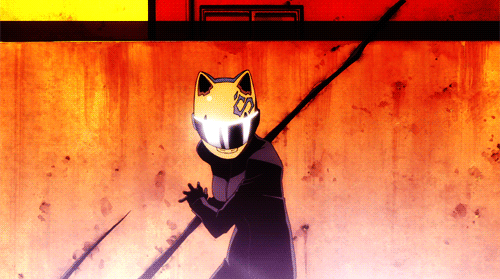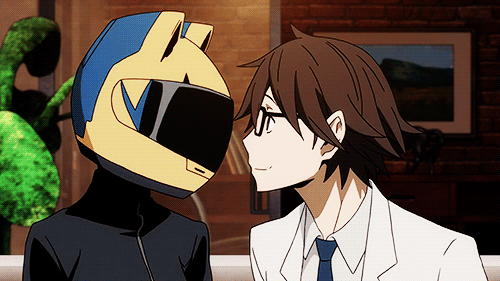No 'Lessons from Anime' today because its taking me much longer to write that anime nihilists post than I thought. And I've been writing other stuff lately. Namely 19,000 words of the fourth book in the HOUR OF MISCHIEF series in the last three days. And since NaNoWriMo is coming up, I figured this would be relevant.
I basically write via sprints. I'm not a slow and careful drafter. I attack the draft with all of my terrible first sentences and messy plot mistakes and useless dialogue and I just let it fly. Better to get everything down and edit it later than risk losing interest in the story. But writing sprints can be hard for some people, especially writers with perfectionist tendencies who like to edit as they go. If that method works for you, that's fine, but if you find yourself never finishing anything because you keep getting bogged down in the details, maybe its time to switch it up.
Writing sprints involve writing and absolutely no editing. They can help you finish a draft, even if its in an extremely rough form. But drafts are never final and it doesn't matter how many times you have to edit it. You can edit the book when its complete. You can't edit words that aren't there.
So here are some tips for NaNoWriMo and writing sprints and general!
1. Don't read. At all.
I know you might want to go back and read your work. Don't. Unless you forget if you mentioned an important plot detail earlier or not, don't. If you go back and read, you'll feel the urge to edit and you'll break your pace. If the last section you wrote is crap, you can edit it later.
2. Don't get bogged down in difficult sections
Having trouble with a scene? Let yourself breeze past it in a paragraph and keep going to more interesting stuff. You can even skip over the scene and go back to write it later. One of the hardest thing in writing sprints are transitions between scenes. Don't stress over them. Just go.
3. Outline
Not everyone is an outliner, but I always sprint best when I know where the plot is going. That way I can set goals and I've already envisioned scenes in my mind before I write them. When I finally sit down to type it out, it flows much easier.
4. Bribe yourself
If you're settling down for a big writing sprint, bribe yourself with rewards. I once bought a bag of starburst jelly beans and ate one for every 100 words I wrote. This makes the process of writing fun and tasty. And if you're good at writing sprints, kind of bad for you.
5. Don't Give up
If you get behind during NaNoWriMo, don't be disheartened. There's plenty of time to catch up. You might have a day you just can't write, but maybe you'll write 3,000 words easily the next day. Its a whole month. Don't beat yourself up about it, even if you ultimately fail. Writing sprints are a difficult thing to learn, and ultimately, as long as you get to the end of the draft, its still a win.
And that's just five tips to make NaNoWriMo easier for you! Get out there and write :)
A literary agent intern, writer and full time student treks through the forest of words
Friday, October 28, 2016
Wednesday, October 26, 2016
Notes from New York: Meshing Fantasy with Reality
Welcome back to Notes from New York. Last week we talked about world building, but this week we are going to dive into a more specific kind of world building: meshing fantasy with reality.
Contemporary fantasy, urban fantasy, magical realism and a host of other genres involve placing magical elements into our normal, everyday world. It can be a great way to view modern day issues through a different lens or just spice up the mundane. It’s an extremely popular method of world building and most comic books make use of this trope with great success, in addition to a swath of movies, TV shows and, of course, novels.
However, just because your book takes place in the modern world doesn’t mean the world building is any easier. In fact often times, meshing fantasy with reality can be difficult. So here’s some problems I’ve noticed in these genres and how to fix them.
1. Not fully integrated
Sometimes it seems like the author tossed in a fantastical element without really thinking about how it would affect the world. Like sure, a vampire society sounds cool, but how the heck hasn’t anyone gotten suspicious, considering all of the people drained of blood? If there are magicians that cause such disturbances, why is everyone so aggressively dumb to the magic going on around them? A lot of books come up with various ways to explain this. Memory charms, hallucinations etc. But if you don’t acknowledge how your magic society deals with the outside world, then it becomes a plot hole. Conversely, if the magic elements are fully integrated and everyone knows about them, how has that changed and shaped society? If it hasn’t had some significant effect, then your world won’t seem very well thought out.
2. Skimping on the setting
Just because you’re not making up the world doesn’t mean you shouldn’t give as much detail to the setting of your novel. Your job is still to root your reader in the story and maybe they haven’t been to the city where your book takes place. Make sure you still do your research and know what you’re talking about or the world will seem quite inauthentic.
3. They Just Don’t Mesh
Sometimes fantasy elements can seem downright random. I read a manuscript in which a fairytale like buddy comedy was mixed with a real life abusive relationship and it just did not pair at all. The fantastical elements felt so random and poorly integrated that sometimes I thought I was reading two different books. Make sure your fantastical and realistic aspects are all wholly necessary to the story you are trying to tell and take time to seamlessly fit them together.
In some ways, I think contemporary fantasy is even harder than inventing a world from scratch, because you do have to play by certain rules. However, so long as you focus just as much on the world building, your manuscript is sure to draw in readers.
Contemporary fantasy, urban fantasy, magical realism and a host of other genres involve placing magical elements into our normal, everyday world. It can be a great way to view modern day issues through a different lens or just spice up the mundane. It’s an extremely popular method of world building and most comic books make use of this trope with great success, in addition to a swath of movies, TV shows and, of course, novels.
However, just because your book takes place in the modern world doesn’t mean the world building is any easier. In fact often times, meshing fantasy with reality can be difficult. So here’s some problems I’ve noticed in these genres and how to fix them.
1. Not fully integrated
Sometimes it seems like the author tossed in a fantastical element without really thinking about how it would affect the world. Like sure, a vampire society sounds cool, but how the heck hasn’t anyone gotten suspicious, considering all of the people drained of blood? If there are magicians that cause such disturbances, why is everyone so aggressively dumb to the magic going on around them? A lot of books come up with various ways to explain this. Memory charms, hallucinations etc. But if you don’t acknowledge how your magic society deals with the outside world, then it becomes a plot hole. Conversely, if the magic elements are fully integrated and everyone knows about them, how has that changed and shaped society? If it hasn’t had some significant effect, then your world won’t seem very well thought out.
2. Skimping on the setting
Just because you’re not making up the world doesn’t mean you shouldn’t give as much detail to the setting of your novel. Your job is still to root your reader in the story and maybe they haven’t been to the city where your book takes place. Make sure you still do your research and know what you’re talking about or the world will seem quite inauthentic.
3. They Just Don’t Mesh
Sometimes fantasy elements can seem downright random. I read a manuscript in which a fairytale like buddy comedy was mixed with a real life abusive relationship and it just did not pair at all. The fantastical elements felt so random and poorly integrated that sometimes I thought I was reading two different books. Make sure your fantastical and realistic aspects are all wholly necessary to the story you are trying to tell and take time to seamlessly fit them together.
In some ways, I think contemporary fantasy is even harder than inventing a world from scratch, because you do have to play by certain rules. However, so long as you focus just as much on the world building, your manuscript is sure to draw in readers.
Friday, October 21, 2016
Lessons from Anime- Ensemble Casts in Angel Beats, Durarara and Assassination Classroom
Welcome back to Lessons from Anime! This week, we’re looking
at another group of shows that all share one key element: ensemble casts.
There are lots of different ways to tell a story. For
instance, you can take the Harry Potter route and root the narrative firmly in
the perspective of one character. But, on another hand, you can write a story
that is about a group of people, like in Mistborn, or even hundreds of people,
like in Game of Thrones. When you have several main characters and just as many
stories, it can be a tremendous balancing act. If you’re not careful, the
scales will tip and you’ll give way too much focus to a few characters while
letting others become practically nonexistent and unnecessary. Today we’re going to look at three anime that sport ensemble
casts to varying degrees of success.

First off, there’s Angel Beats, a well-known tear jerker and
a show that sports quite the large cast in its group picture at the closing
song. This show relies on a wide range of characters. Even though it
has its main characters, it clearly wants you to focus on the group as a unit,
especially when the show takes its more feelsy turns later on. Does it succeed?

Not…really. Outside of a group of about five characters,
none of the other cast get any noticeable screen time. They are reduced to
typical anime caricatures, good for a laugh but not as their own people. They are
sometimes indistinguishable from each other. The show just didn’t have balance
in its writing and at only thirteen episodes, it really didn’t have time to
keep such a large cast afloat. If you’re going to have a lot of characters,
make sure they actually need to be
there for more than a one off joke.

Then there’s Durarara, which yeah, I know, this is the third
time in a row I’ve brought it up, but its relevant. Durarara also supports a
large cast with a few clear leads in the mix. However, each of its characters
are involved in different stories that collide at different points. The
characters aren’t a collective unit. They’re a series of moving pieces that
pass each other in the street. This is more the Game of Thrones approach of
having several different storylines that eventually converge.

But while Durarara does a decent job with its cast of
thousands, it still lets a few plots go by the wayside, including some twin
sisters that are good for a laugh but have absolutely nothing to do with any of the plot. There are plenty of one off
characters that felt like they needed more screen time. But, to be
honest, I’m surprised Durarara managed its juggling act as well as it did. It
goes to show that when you give yourself several plot threads, make sure
they’re well integrated and they all reach some sort of resolution. That way
they won’t fall off the map and leave your readers wondering why they were
there in the first place.

The last show I want to talk about is perhaps the most
effective of the bunch, called
Assassination Classroom. Like Angel Beats, this is about a group as a unit,
focusing on a classroom of twenty eight students and their teacher (a mutant
who is going to blow up the world in a year). It has a main character lending
his narration to the events, but the show is conserned with all of the
characters. And I mean all of them.
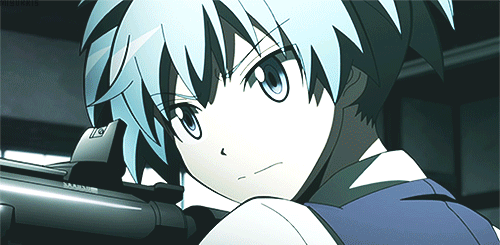
Of the twenty eight students about half get a significant
part of an episode dedicated to them and every single one of them has a
starring moment. And none of the kids are anime caricatures. They’re real,
relatable kids. They’ve all been put in the dead end class for failures for
various reasons. Some of them are lazy geniuses, others struggle with
academics, some face pressures at home. But they all have their own interests
and passions that their teacher ultimately uses to their advantage. Many
characters don’t get much of a spotlight, but they work as they are supposed
to: as part of a unit. And by the end, they really do feel like a family.
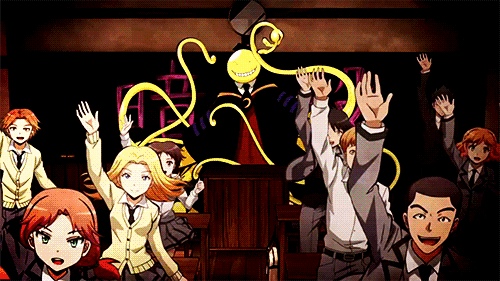
Assassination classroom has 48 episodes to work with of
course, plenty of time to give its characters their rightful places. But it
uses those 48 episodes exceedingly well, and I don’t remember the last time
I’ve seen anything handle such a large cast so expertly, especially when
they’re all in the same area for most of the show, following the same plot thread.
 |
| Its also hilarious |
As you can see, there are many ways to handle large casts,
with multiple plotlines or just one. Your mileage may vary, but make sure you
know your characters and just how much time they deserve in the spotlight.
Balance is the key and we want to love your characters as much as you do!
Labels:
anime,
character,
character arc,
characters,
comedy,
contemporary,
Durarara,
Fantasy,
lessons from anime,
plot,
urban fantasy,
writer's life,
writer's tips,
writing,
writing life,
writing tips
Wednesday, October 19, 2016
Notes from New York: World building is Important
Welcome back to Notes from New York! Let’s continue with
more tips for preparing your book for submission. This week: World building.
Obviously I’ve posted a lot on this beforehand, given that
it’s a pretty prominent part of my favorite genres. I even started a Vlog series on it that I hopefully get back to soon. I really enjoy talking about it and actually doing it. But world building is also an
exceedingly difficult thing. There are a lot of elements to take into account
to make your world a fully fleshed out reality.
And that’s the key here: fully fleshed out. It’s pretty easy
to spot a fantasy world as thin as parchment paper. While it theoretically
exists on the page, there’s clearly no foundation holding it up. It shows that
a writer wanted to tell their story in a fantasy world but thought way more
about the story than the world itself. Sometimes it seems like they’re making
up the world on the fly, and that always shows loud and clear.
In fantasy, the world is a character. You want to give it
the same development as your protagonist, maybe even more so. Worlds are, after
all, more complicated than people. And when querying you can’t get away with an
under developed world because a lot of awesome fantasy comes through the slush.
I read more than one MS that had me ridiculously excited because of its unique
world. A lackluster world pales in comparison to that. So before you query your
fantasy, here are a few tips:
1. Consider all of the main aspects of your world
including: Geography, government, history, economy, religion, culture,
technology etc. You should understand these things even if they don’t play a
huge role in your story. Because if you don’t, the gaps will show
2. Don’t skimp on the setting. Setting gives us a
picture of your world and places us inside of it. So focus on your descriptions
in order to envelop the reader in your world
3. Don’t use stock fantasy worlds. The typical
medieval fantasy setting with few variants is played out. If you want to catch
someone’s interest, make sure the world has something new to it, be it a magic
element, a technology element, or a cultural element. If you’re going to stand
out in a sea of stock fantasy worlds, you need to add some new twist.
World building is obviously much more complicated than that,
but it’s important to know that agents can often tell even from the query and
first pages whether or not your world is well thought out. So develop that
setting and make your world shine! Your book will improve right along with it.
Friday, October 14, 2016
Lessons from Anime- Durarara and Rolling with the Punches
And we’re back with more Lessons from Anime!
I know I talked about Durarara last week, but honestly, I
really have to talk about it again because I love this show. It honestly
reshaped some of perspective on storytelling and showed me a different way to
handle serious dilemmas, philosophical discussions and fantastical elements.
The fantastical elements are the focus of this particular
lesson.
One of the pitfalls of any fantasy book, show or movie is
the dreaded info dump. Its very easy to fall into because, hey, world building
is hard and when you’re trying to bring the reader into a complex world, you
just want to spout all of the information from the beginning. Its dfficult sometimes to trust your reader to follow you, or to know how much to give them
at the front. I always struggle with
this in my fantasy because I have a tendency to give myself over complicated worlds to work
with. Thanks me.
And then there’s Durarara. This show sports all sorts of
fantastical things. A headless Irish fairy that rides a shadowy bike instead of
a horse.
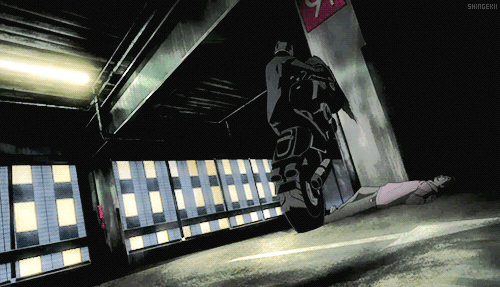
A man who’s body has no physical limits, allowing him to pick up and
throw things like vending machines and light posts.
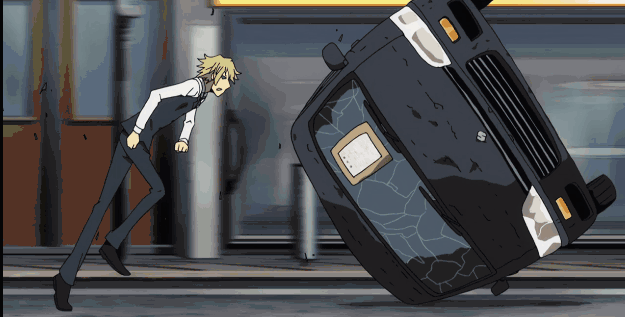
A sword that loves humans
and can control everything it cuts.

And that’s just the beginning of the
strange residence of the city of Ikebukoro. Most stories would try to
contextualize all of these strange beings and explain why they exist in this
story. And while the characters themselves are given a fair ammount of
backstory, the show never really tries to explain the fantastical elements.
They’re just there. Because it said so.
And you know what, there’s something kind of wonderful about
that sort of storytelling. While other books sit you down for a history lesson,
Durarara grabs you by the hand and asks you to roll with the punches. The
explanation doesn’t matter, it’s the story and how the characters bounce off
each other that the audience cares about. Don’t get caught up in the details.
Enjoy yourself and have fun!
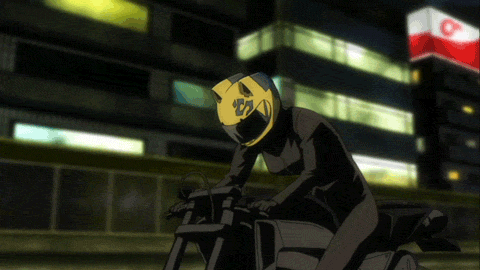
Now I’m not saying that Durarara has no world building. It
explores all of its fantasy elements from a psychological perspective. And all
of its elements and characters, once introduced, remain consistent throughout
the run of the show. Once or twice it forgets to adequately explain something
or a strange character falls by the wayside, but for a sixty episodes show
sporting a cast of thousands, it does a good job with what it has.
And I think we, as fantasy writers, can learn a lot from
Durarara. So next time you’re about to info dump, remember to trust your
audience to follow you. Be sparing with your information, grab them by the hand
and yank them right in. They’ll be able to keep up. They’re smart. And the
world ultimately isn’t the most important. It’s the story within it that
matters.
Wednesday, October 12, 2016
Notes from New York- Forced Conflict
Last week we talked about spotlighting trivial conflicts over big, life changing dilemmas and how that can drag down. But today I want to talk about forced conflicts. These are plot threads that an author often adds just to spice up the tension but, ultimately, they just aren’t needed.
I spoke last time of a manuscript that gave focused to a character conflict over far more pertinent financial struggles and natural disaster fall out. Well this same MS also had its fair share of forced conflict. The characters always seemed to be clashing for really unnecessary reasons. All of the dilemmas were easily solvable by communication but instead the author dragged them out for as long as possible. It made the reading experience frustrating rather than engaging, and that it is a fine line you really don’t want to cross.
The Lord of the Rings movies, on a larger scale, also had some forced conflict that didn’t necessarily need to be there. There are enough stakes with the orcs and Mordor and a quickly developing, worldwide conflict. But changes like making Faramir an asshole honestly detracted from the movie rather than adding to it. Peter Jackson added this conflict because he didn’t want to lose the stakes but there were plenty of stakes to begin with. Also it didn't happen in the book.
So, how do you tell if your side conflicts are forced? Well here are a few hints.
1) They can be easily solved
If you have to use contrivances like misunderstanding and miscommunication to keep a conflict going, it’s going to feel forced. Misunderstanding can be an excellent story telling device in comedy but in dramas it is tiring, especially when the misunderstanding continues on for several pages without resolution.

2) They are contrived
Good conflicts are built up over time. Bad conflicts are caused by contrivances like a character walking into the room at just the wrong time to hear just the wrong words, often out of context. Stuff like Shrek walking up to the house in time to hear Fiona’s words out of context and making him think she’s calling him an ugly ogre. It’s the kind of stuff that makes you want to mutter ‘are you kidding me’. Your third act tension should be caused by something legitimate, not just some easily avoided misunderstanding

3) They are predictable
A long time ago I did a post on the ‘liar revealed’ trope, especially focusing on A Bug's Life. This plot usually begins with the telling of the lie and in your heart, the entire time, you know the lie must be discovered and then forgiven. Any tension created off of this plot is so predictable because we know the reveal will come and we know that ultimately the hero will be forgiven and it won’t matter in the end. So dragging out the lowest point as a ‘will they be forgiven’ plot point is so boring because we can see the resolution coming a mile away. I loved the most recent Star Wars movie because when Fin reveals he lied about being part of the resistance, Rey barely cares. There are more important things to worry about. It was beautiful.

4) They are unnecessary
Sometimes, your book has plenty of tension. Really. If the world is ending or the town is flooding or someone is dying that is plenty of tension. Sometimes a forced conflict is just an unneeded crutch that holds the actually interesting plot back. And as we discussed last week, you want to focus on the right things. It’s not that you don’t need small conflicts and arguments along the way, but they shouldn’t outstay their welcome.

Sometimes, small conflicts happen, in fiction and real life. And subplots, of course, are the spice of a novel. But if you find a side conflict dragging on too long, relying on contrivances or taking the focus from more important conflicts, it may be time to tone it down a bit. Your readers will thank you for it.
I spoke last time of a manuscript that gave focused to a character conflict over far more pertinent financial struggles and natural disaster fall out. Well this same MS also had its fair share of forced conflict. The characters always seemed to be clashing for really unnecessary reasons. All of the dilemmas were easily solvable by communication but instead the author dragged them out for as long as possible. It made the reading experience frustrating rather than engaging, and that it is a fine line you really don’t want to cross.
The Lord of the Rings movies, on a larger scale, also had some forced conflict that didn’t necessarily need to be there. There are enough stakes with the orcs and Mordor and a quickly developing, worldwide conflict. But changes like making Faramir an asshole honestly detracted from the movie rather than adding to it. Peter Jackson added this conflict because he didn’t want to lose the stakes but there were plenty of stakes to begin with. Also it didn't happen in the book.
So, how do you tell if your side conflicts are forced? Well here are a few hints.
1) They can be easily solved
If you have to use contrivances like misunderstanding and miscommunication to keep a conflict going, it’s going to feel forced. Misunderstanding can be an excellent story telling device in comedy but in dramas it is tiring, especially when the misunderstanding continues on for several pages without resolution.

2) They are contrived
Good conflicts are built up over time. Bad conflicts are caused by contrivances like a character walking into the room at just the wrong time to hear just the wrong words, often out of context. Stuff like Shrek walking up to the house in time to hear Fiona’s words out of context and making him think she’s calling him an ugly ogre. It’s the kind of stuff that makes you want to mutter ‘are you kidding me’. Your third act tension should be caused by something legitimate, not just some easily avoided misunderstanding

3) They are predictable
A long time ago I did a post on the ‘liar revealed’ trope, especially focusing on A Bug's Life. This plot usually begins with the telling of the lie and in your heart, the entire time, you know the lie must be discovered and then forgiven. Any tension created off of this plot is so predictable because we know the reveal will come and we know that ultimately the hero will be forgiven and it won’t matter in the end. So dragging out the lowest point as a ‘will they be forgiven’ plot point is so boring because we can see the resolution coming a mile away. I loved the most recent Star Wars movie because when Fin reveals he lied about being part of the resistance, Rey barely cares. There are more important things to worry about. It was beautiful.

Sometimes, your book has plenty of tension. Really. If the world is ending or the town is flooding or someone is dying that is plenty of tension. Sometimes a forced conflict is just an unneeded crutch that holds the actually interesting plot back. And as we discussed last week, you want to focus on the right things. It’s not that you don’t need small conflicts and arguments along the way, but they shouldn’t outstay their welcome.

Sometimes, small conflicts happen, in fiction and real life. And subplots, of course, are the spice of a novel. But if you find a side conflict dragging on too long, relying on contrivances or taking the focus from more important conflicts, it may be time to tone it down a bit. Your readers will thank you for it.
Friday, October 7, 2016
Lessons from Anime: Why so Serious? (Baccano and Durarara)
Alright, we’re back with a new stretch of Lessons from
Anime. I know some of you (many of you) aren’t anime watchers. I understand.
Jumping into anime is as vague as jumping into movies. Because Anime is only a
medium of Japanese animation and can cover every genre under the sun. Also, it
has a tendency to explore some weird stuff. I usually don’t recommend people
jumping into Anime without a world weary guide of sorts to give them
recommendations.
However, once you’re into the anime craze, it’s hard to
stop, and I’ve found that my writing has always been influenced by anime over
everything else. Many of my favorite stories from any medium come from anime.
So as we pick up this series again, we’ll be looking at why exactly I take so
many different writing lessons from these shows and how you can too, even without watching them (Though I highly recommend many of the shows discussed on this series). With that said:
Let’s jump in.
Ever heard the phrase ‘why so serious’? Of course you have.
It’s hard to escape the Dark Knight or the legions of joker cosplayers that
smear makeup on their face and call it a day. I love the Dark Knight, of
course. Its one of the only Christopher Nolan films I remotely enjoy. That’s
because Christopher Nolan films take themselves extraordinarily seriously to
the point of being boring and melodramatic. The joker, the chaotic evil villain of the
evening, is the only one to lend even a hint of humor, however dark. He brings
up a good point in ‘why so serious’. Namely, why is it that violent, action
movies have to take themselves so gosh darn seriously?
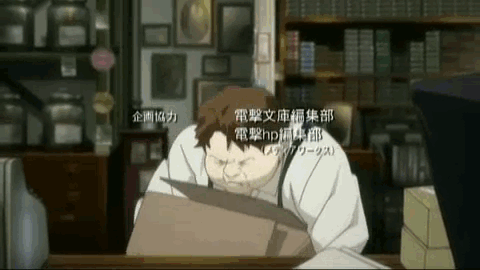
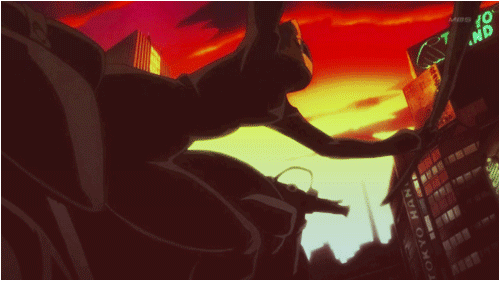
Baccano and its spiritual successor, Durarara, are two shows
filled with dark concepts on paper. Baccano has mobster shootouts, torture,
sadists and a whole lot of defingerings. Durarara has gangs, headless
riders, suicidal thoughts and serial killers. It would be easy to make either
series into a super serious battle to death sort of story.
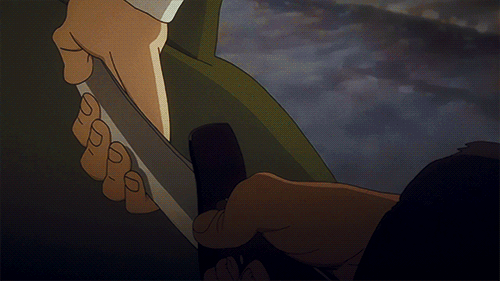 |
| Don't worry, he'll be fine |
But that wouldn’t be in keeping with the ‘why so serious’
spirit, would it?
Both Baccano and Durarara are just so much fun. And not even in a dark sense of
humor sort of way. Baccano has such an entertaining, light hearted tone that it would
almost fit in with the other Saturday Morning Cartoons. You know, if not for the blood.
Yeah, it could take itself more seriously, but when half of your characters are
immortal and the other half are kind of nuts, why worry about stakes? Its about
how these people bounce off each other. Thieves like Issac and Miria steal by
their own strange moral code and spread happiness to everyone around them.
Jacuzzi Splot cries, but then goes in and kicks ass with his pyromaniac
girlfriend. Ladd Russo kills a lot of people but he’s just so filled with puppy
like excitement, it’s hard not to love him.

This show isn’t about the black and whites of morals but
rather all of those little greys in between. None of the characters fall on the
lawful good section of the alignment spectrum--or the lawful spectrum at
all--but that all makes them so much more fun.

Durarara has more of a point than Baccano (which exists for
the purpose of being shallow fun), and has its share of serious topics. It
explores the desire for power, the effect of social media on the modern world,
and of course, suicidal thoughts. But it all operates under a more optimistic view of ‘life
happens and you get through it’. The world isn't really so awful as it seems.
Characters you would think are irredeemable
love and live and laugh. They all have comedic moments. They have dramatic
moments too. But in your heart, you know that the show is going to take an
optimistic spin. It’s not the sort of show to kill off its cast of thousands.

And on top of that it has some of the most ridiculous stuff.
Durarara is not bound by the mechanics of reality and watching a man throw a
fridge at another man has never been so funny. It has twisted love stories,
many of which will even have you asking ‘why’? But you get the feeling Durarara
is never making any moral judgments. It’s just showing a bunch of screwed up
people living their lives.

But why does it matter? Why are shows like these ultimately
more effective than the ‘everything is dark’ Christopher Nolan approach?
Because humor, however dark or ridiculous, is often the real coping mechanism
we need. And optimism, honestly, is so much more valuable than cynicism.
Baccano asks ‘why so serious’ and Durarara insists ‘the world isn’t as bad as
you think’ and honestly, I get so much more hope and enjoyment from both of
them.
Never take your stories or characters too seriously. Give
them room to enjoy themselves and breathe. Sometimes issues are best explored
through a little humor. Sometimes a good laugh over the craziness of life is
worth more than tears.
Wednesday, October 5, 2016
Focusing your Conflict
Welcome back to Notes from New York. Today, we’re talking
about focus. When you write a novel, some elements take the spotlight over
others. This is necessary. You can’t give equal attention to every element of
your novel. Some things are meant to take center stage while others skirt
around in the background.
One of the biggest mistakes you can make in your story is
focusing too much on the wrong thing. Every story as multiple conflicts and
sometimes, the story devotes far too much attention to the wrong conflict. For
instance, perhaps there is a post-apocalyptic event or war. Because of the
magnitude of this crisis, one would expect it to take the spotlight. But
sometimes, funny enough, a book pours its focus into a comparatively smaller
plot, like a romance. I mean sure, I get it, romance is important to a lot of
novels but if you’re focusing on conflict between your main couple while bombs
are going off in the background...there might be a problem.

Hunger Games played off this trope by emphasizing the irony
in constructing a romance angle in a fight to the death. Other novels, like
Harry Potter, Mistborn etc. keep the romance as a subplot, giving the focus to
the more interesting things. You know: dark wizards and saving the world.
Now obviously, I’m giving a drastic example, but this can
happen in contemporary fiction as well. I read a manuscript once where an
arbitrary conflict between characters took a lot more focus from far more
severe financial struggles and a natural disaster. Reading the MS had me
wondering aloud ‘does this really matter right now?’ You don’t want your reader
doing that.
So when you’re looking at your conflicts in your book, think
to yourself: What are my conflicts? Make a list of all of them, from the bigger
plot stuff to the character level dilemmas. Then reorganize that list, putting
the biggest conflict at the top and the smaller at the bottom. This should help
to illustrate which plot threads should be getting the majority of your focus.
Never give your reader the chance to wonder ‘why does this
matter’? Focus on the right conflicts and your MS will thank you for it.
Subscribe to:
Comments (Atom)


